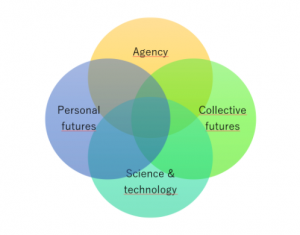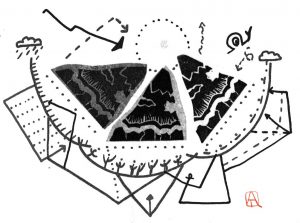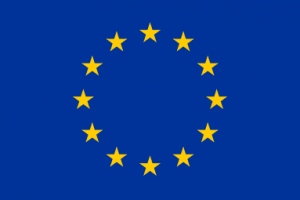FEDORA is ready to present her first results at the ESERA2021 conference that will be held online from August 30th to September 3rd. ESERA means the European Science Education Research Association and the conferences of this association are organized biannually. They are currently the most important and most attended appointments occurring in Europe for researchers in science education who come not only from Europe but from all over the world. The 2021 edition is organized by the University of Minho (Portugal). In the 2019 edition, held in Bologna (Italy), more than 1600 researchers participated. Professor Sibel Erduran, the coordinator for the University of Oxford in FEDORA, is currently serving as the president of this huge and prestigious association.
FEDORA will present at the 2021 edition a poster and three oral presentations that report some results of studies that ground their roots in the Erasmus + project I SEE and are, then, further developed within the framework of the third Work Package (WP3) of FEDORA, whose aim is to “futurize science education”.
The titles of the presentations are:
- A FRAMEWORK FOR ANALYSING STUDENTS’ FUTURE PERCEPTIONS RELATED TO AGENCY, SCIENCE, AND TECHNOLOGY. Antti Laherto, Tapio Rasa, Giulia Tasquier, Martina Caramaschi, Erica Bol, Els Dragt, Olivia Levrini.
- BROADENING PERCEPTIONS OF FUTURE, TECHNOLOGY AND AGENCY: STUDENTS’ EXPERIENCES FROM A MODULE ON FUTURES THINKING AND QUANTUM COMPUTING. Tapio Rasa, Antti Laherto, Elina Palmgren.
- NETLOGO “TOY” SIMULATIONS AS LABORATORIES TO IMAGINE THE FUTURES. Eleonora Barelli, Olivia Levrini.
ESERA delegates can watch the prerecorded videos in advance and participate in the live session for discussion that is scheduled on the first day of the conference, Monday, August 30th, at 12.30 am (CEST).
We do hope to receive many comments from the ESERA participants so as to go on developing more and more effective science teaching approaches that can support the young to imagine and build their desirable futures.
FEDORA envisions a radical transformation of contemporary schooling such that students can be equipped with those skills that will help them manage their future lives and the uncertainty that they entail. How can such a vision be implemented? How can educational reform be structured to enact such a vision?
A key set of contributors who have the decision-making power in addressing such questions are policy-makers. Policymakers are individuals in the different national contexts of the project who influence policies about curriculum, assessment and teacher training to name a few. When the Oxford team asked the UK policy stakeholders what they themselves view as competencies that could frame future-oriented science education, they referred to the need to shift away from a knowledge-rich curriculum towards more cross-cutting, contextual and interdisciplinary approaches.
But how can such competencies be assessed? How can educational systems be re-calibrated to align such ambitious visions with the reality of high-stakes assessments in science education? Reforming the science curriculum and pedagogy without a coherent alignment in reform about assessment, such visions are likely to fall short. How can national and high-stakes examinations be designed to align curriculum, instruction and assessment? The Oxford team and FEDORA Work Package 5 will be posing such questions to policymakers and developing some recommendations at a national, as well as cross-national level. Watch this space!
A lack of stable future horizons, caused by global crises and accelerating societal and technological development, obscure young people’s relationship with the future. At the same time, future-oriented transformative actions are needed more than ever. Science education has a significant potential to provide students with tools for connecting with, and finding agency within, their personal as well as collective futures. Science education is also a natural context for young people to examine their hopes and fears regarding technology, linking the transformative power of technological development to human value-based agency.
To address these issues while leveraging their interconnections, FEDORA Work Package 3 titled “Futurizing science education - Analysis of Blind spot 3”, has set out to analyse young people’s perceptions of the future in relation to science and technology. Building on earlier initiatives to develop future-oriented science education, we have developed an analytical framework interconnecting literature on science education, futures studies, youth studies, science and technology studies and educational studies on agency. The goal is to collect information to represent students’ conceptions in and between the domains of personal futures, collective futures, agency, and science & technology.
The FEDORA consortium has launched four part-studies employing the framework, each focusing on some domains and their connections presented in Figure 1. The partners are currently working to compile the preliminary results, integrate and interpret them using the shared framework, and come up with research-based recommendations to be used when developing future-oriented science education modules during the second project year. Stay tuned!

Figure 1. The domains of students’ perceptions under investigation in FEDORA: personal and societal/global (‘collective’) futures, agency, and science & technology. The empirical research in FEDORA focuses especially on the interrelations (overlaps) between these domains.
Cycles are part of life, and it resembles a circular path the fact that we are now, as researchers and science education professionals, seeking to get outside the classroom in pursuit of innovative ways for meaningful education.
Open schooling wants to reach beyond the walls of the classroom and its school, and create a beautiful entanglement with the communities that inhabit its territory. It will be in the establishment of these relations where discoveries and the sense of meaning have more chances to flourish.
This is why on June 3rd two European projects, SEAS - Science Education for Action and Engagement towards Sustainability - and FEDORA - Future-Oriented Science EDucation to enhance Responsibility and engagement in the society of Acceleration and uncertainty - got together to dialogue and see the possible synergies between both approaches. While SEAS is in its final stages, FEDORA has just begun. This enables SEAS and its team to inherit their learnings and frameworks to the new and energetic FEDORA team.
In the words of Alfredo Jornet, member of the SEAS coordinator team from the University of Oslo, “we’ve been studying the disentanglement between knowledge and action, and finding the ways to bring them back together: knowing and understanding with acting and doing”. On the other hand, Olivia Levrini, FEDORA's Coordinator, stated "Learning from SEAS experience and findings will enrich our approach and it will certainly help overcome the disparities".
How does an Open Schooling approach will help to address the complex challenges posed to our societies? What types of scientific knowledge and skills do the future generation need to confront and make a change to dealing with contemporary challenges?
The joint SEAS-FEDORA approach to Open Schooling envisioned STEM education as a powerful driver of social change with high transformational potentials.
The next steps, shared by Giulia Tasquier, who is involved in both projects, will be organising focused working groups and keeping the conversations flowing among both projects.
"...summoning up your memories one by one, your wolf will have become another wolf, your sister a different sister, your battle other battles, on your return from Euphemia,
the city where memory is traded at every solstice and every equinox." - Italo Calvino, Invisible Cities.
When we designed the proposal and planned a study group on interdisciplinarity - FEDORA first blind spot - we imagined ourselves in a two-day long residential workshop in Bertinoro. It is a beautiful location in the hills, not far from Bologna, called "the Balcony of Romagna" for its breathtaking view of the sea and the mountain. We imagined ourselves, a group of people with very different backgrounds, to share words, knowledge, pieces of experience in the castle that dominates the town and hosts the University Residential Centre and the Interreligious Museum. We were sure that the authentic restaurants, famous for their "piadina and Sangiovese" (a typical bread and red wine), would have facilitated our interactions.
The idea was to create a trading zone where interdisciplinarity was not the theme of academic discussions but an actual practice, a live learning mechanism that we had to activate to know each other and share methods and languages to reason on knowledge generation and organisation. A facilitator would have been in charge of analysing our dynamics and languages and representing them visually.
Instead, contingencies like a pandemic made future diverge from plans, and we found ourselves organising the study group on Zoom and searching for other ways to set up a trading zone.
In preparation for the online meeting, we shared metaphors, images, stories, experiences…
Despite the insufficient logistic context, an incredibly rich bunch of ideas emerged. Framed by the papers of Akkerman and Bakker on boundary crossing and objects, and by the Family Resemblance Approach, developed by Sibel Erduran, Zoubeida R. Dagher and colleagues, we have been inspired by the Gaelic word "meitheal", the performances of Gandini Juggling, and by The city of Euphemia by Calvino (The invisible cities).
In this virtual context, we explored the multi-dimensional roles of disciplines, the barriers they create, and their pros in structuring reasoning and mediating the interaction. We then challenged ourselves by wondering what attitudes and skills are needed to accept the risk of crossing boundaries and have an authentic experience as boundary people.
A great resonance in the group emerged around the idea that interdisciplinarity in STEM education implies not only managing tensions between belonging-nonbelonging, defining-negotiating meaning, going in-out a comfort zone, zooming in-zooming out (from details to big pictures and vice versa). It also entails managing a particular kind of equilibrium that we called "between sense-making skills (systems, critical, analytical thinking) and strange-making skills (creative, imaginative, anticipative thinking)."
What forms of epistemic practices and knowledge organisation, what facilitation scaffolding is needed to educate pupils, teachers, educators and ourselves to manage such an equilibrium?
These questions are our challenges for the next steps of our researches and discussions that, for sure, we will continue in newer and newer modalities and in a continuous search for inspiring logistic contexts.
One of the inspirations that led the FEDORA team to put together the ideas and essence for this project, was the work of the philosopher, sociologist and politologist Hartmut Rosa. His view of our society as a society of acceleration led us to think of the misalignments that this acceleration produced in the way science is taught in formal spaces.
Hartmut Rosa was recently invited to the “Future Congress”, a yearly event organised by several organisations in Chile. This year, his presentation was online and it is accessible here.
In his 16-minute talk, Rosa describes his societal interpretations, focusing on his theory of desire for control, which in his view has two main aspects. One is cultural, and here he sees a never-fulfilled human desire for more reach. The idea of the good life is steered by what he describes the 3 As: available, accessible and attainable. The desire for more control. Reach more visibility of the space and also at microscopes, in our body. We want to increase the horizon of reach, physically, and access there. And once we are there, think of colonialism, get control of the territory, gain control over things: our body, matter, politics, and then use these things. Increase the horizon of what we can get available, attainable and accessible, and there, money has a huge role to play.
About the paradox that happens while doing this, he states that by trying to control more, we lose more control, and more powerful ideas, hit the play button!

Although benchmarking is an expression that comes from the business world, scoping and signalising what the competition is doing and what level of development they are, its practice has gone beyond this area. Different disciplines use it as a way of mapping the beginning of a study or project.
In FEDORA, we see the need of depicting different approaches that can be linked to the blind spots that we have recognised, especially when we consider coming up with new narratives for science education. That’s why one of our partners, formicablu, prepared an internal work document called Benchmark of existing examples of cross-media and innovative science communication. It aims to map the state of the art and the resources that we, as a project consortium, consider valuable as inspiration and informing sources for the different steps in the project.
We recognise the formality, hierarchy and intended neutrality in the languages usually adopted to teach science and address complex and uncertain issues. Therefore, it is essential to explore and propose new imaginative narrative languages in this era of acceleration, one of our ethe as a project. As stated in the document, this is not a linear task, and there are not many ready-to-use available resources to rely on.
How did we benchmark the “narratives for science education” landscape? Our methodology considered desk research, a survey among our partners, and two consultation events, which led to crowdsourced expert information. One of the events was a 40-minute session during FEDORA Kick-off and the second event was a two-hour workshop. These phases led us to a body of resources that considers 20 European projects, 33 books, 25 websites, 23 films, nine opinion articles and five databases as a starting point.
The iterative and co-creative character of FEDORA places this benchmarking as a starting point that will be continuously reviewed, revisited and enriched, enabling us to prototype a range of new and diverse possibilities within the consortium and then, in a subsequent step, with the involvement of other experts and professionals.
By addressing this blind spot, we aim to equip teachers, teacher trainers, and students with linguistic, argumentative, and imaginative thinking skills. We consider these skills valuable to face contemporary challenges and provide them with languages, frameworks and conceptual tools to innovate and futurise science education.
Bioinspiration informs biodesign...what ideas come to your mind if you would have to turn this plant and its droplets into a building or another object? As this idea-sparking picture, we are keen on looking at things through new lenses. Since our project launched, we've been busy working towards our scene-setting. On one hand, we are preparing the magnifying glasses to better explore the blind spots that are the backbone of the first phase of our work.
The Kaunas University of Technology is looking into the way research and innovation intertwine with science teaching and learning systems and their dynamics. Formicablu is exploring the dominant narratives and who are the key actors that are questioning them, in order to bring those views and theories into our approach. The University of Oxford has been putting the threads together for having a baseline to bring in policymakers' points of view into the game. Curious to know more? In our resources section, and read the documents resulting from these studies.
In times where no face-to-face meetings are possible, engagement and motivated teamwork still are! An active and hard-working agenda was the tone for the two-day meeting where all 6 institutions gathered last October 29-30, 2020. Professor Olivia Levrini, the Project Coordinator from the University of Bologna, led several phases of the journey, which included formal presentations about the projects' phases, together with interactive sessions that aimed to connect and relate all project partners.
Every partner agreed on the need for regeneration of the narratives and paradigms that underly science education, and that the needed changes will need time to happen and will be enabled by a common and collaborative vision of where are we moving. Therefore, imagination plays a key role in building the future we are aiming for.
FEDORA´s different steps and events will be timely informed here. We invite you, dear reader, to stay tuned and subscribe to the coming invitations.
